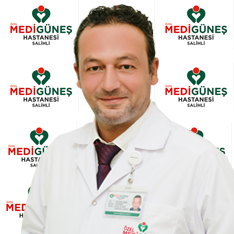Brain Surgery
Brain, Nerve and Spinal Cord Surgery; It is the branch of medicine that deals with diseases of the brain, nerves and spinal cord that require surgery.
Contrary to popular belief, the possibility of death or damage as a result of most brain surgeries is almost the same as other surgeries. With the developments in technology in the last 10 years, preoperative diagnosis opportunities have increased greatly. All surgeries are performed under a microscope and using microsurgical methods.
Post-operative intensive care services are also modern in terms of both equipment and expert personnel. The latest techniques, current diagnosis and treatment methods are used in our clinic and hospital.
Our Brain, Nerve and Spinal Cord Surgery Clinic; It provides services with our expert doctors and advanced technology.
Main Diseases Treated in Our Brain, Nerve and Spinal Cord Surgery Clinic
Spine and spinal cord diseases (lumbar and neck herniations, fractures, slips, tumors and inflammatory diseases)
Traumas (nervous system injuries caused by traffic accidents, falls, etc.)
Tumors (all benign and malignant tumors, pituitary gland diseases)
Vascular diseases of the brain and spinal cord (vascular bubbles, brain hemorrhages, vascular occlusions)
Treatment of hydrocephalus (excessive accumulation of cerebrospinal fluid in the brain)
Congenital spine and spinal cord problems (treatment of diseases such as meningocele, meningomyelocele, separated spinal cord)
Neck hernia:
Neck, back, shoulder, arm pain, numbness and weakness occur. There are complaints of pain, loss of sensation and loss of strength. In the early period, rest, muscle relaxants and painkillers are applied. If the complaints do not go away, surgical intervention is performed after a definitive diagnosis is made through examinations (MRI, etc.).
Bel Fıtığı:
Complaints of lower back pain, leg pain, leg numbness, thinning, and weakness occur. In the early period, rest, muscle relaxants and painkillers are applied. If the complaints do not go away, surgical intervention is performed after a definitive diagnosis is made through examinations (MRI, etc.).
Celebral hemorrhage:
Generally; Cerebral hemorrhage with symptoms such as headache, vomiting, change of consciousness, weakness in one half of the body, speech disorder; It is a condition in which the blood-fed area becomes inoperable as a result of blood leaking out of one or more of the vessels feeding the brain.
In our clinic, cerebral hemorrhage is diagnosed with Computerized Brain Tomography. Depending on the tomography results, Cranial MRI or Cerebral angiography examinations are performed when necessary.
Glioma:
Glioma; It manifests itself with symptoms such as headache, vomiting (gushing), epileptic fainting spells, signs of paralysis in some parts of the body in later stages (depending on where it is located in the brain), personality disorders, and impairment in some abilities (such as calculating, writing).
In our clinic, a brain tomography or MRI is performed to image the inside of the head and brain for a definitive diagnosis based on the symptoms.
Treatment of brain tumors is surgery. In our clinic, all tumors, whether benign or malignant, are treated surgically. However, in some cases, surgery may not be possible. The tumor is left in place due to the risk that the tumor will settle in some vital areas of the brain, which are very sensitive, and touching these areas may be life-threatening.
OUR TEAM

Other Units
Main Menu
